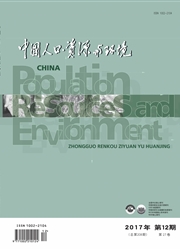

 中文摘要:
中文摘要:
社会资本在多大程度上影响着公共事业的发展是一个悬而未决的重要理论命题和政策困惑.而越来越多的证据表明社会资本对增长、公平、贫困和环境可持续发展等有重要影响,本文以中国日趋加剧和受关注的环境问题为研究对象,提出了社会资本、制度环境与环境治理绩效之间关系的三个基本假说。采用结构方程中的MIMIC方法测算了2004-2011年186个地级及以上城市宏观层面的社会资本水平,实证考察了社会资本对环境治理绩效的影响程度和两者间的非线性关系以及制度异质效应。稳健性检验也进一步证明了结论的可靠性。研究发现:全国层面的社会资本呈现出较稳定的上升趋势。在地区分布上。东部地区的社会资本最高.西部地区其次.中部地区最后;社会资本总体上有利于环境治理。尤以社会信任和社会沟通的效应最为明显;社会资本与环境治理之间确实呈现倒U型的非线性关系,社会资本存在着一个适度水平;政府质量和市场化程度越高.社会资本的环境治理效应越大,改善政府质量所带来的社会资本边际环境治理效应更高.目前中国环境治理困局是多方面原因造成的,绝大部分城市面临着社会资本不足所导致的社会机制不全的困境;社会资本水平并不是越大越好。特别是当所处的制度环境尤其是政府部门难以满足社会资本的“需求”时,社会资本反而会引致环境治理的低效;但是如果政府部门努力提升公共服务水平和自身的运行效率,引导和沟通机制顺畅,实现与社会资本的匹配.会更有利于提升环境治理绩效。本文建议,重视社会机制尤其是社会资本在环境治理过程中的作用.发挥政府质量和市场机制在形塑和提升社会资本环境治理效应中的作用,促进社会资本与制度环境的匹配与衔接。对社会资本不同类型地区而?
 英文摘要:
英文摘要:
The extent to which social capital affects the development of public policy is an important theoretical proposition. Increasing evidences suggest that social capital has an important influence for growth, justice, poverty and environmental sustainable development. This paper takes increasingly intensified environmental issues as the study object, puts forward three basic hypotheses about the relationship between social capital, institutional environment and environmental management performance, adopts structural equation of MIMIC method to estimate the social capital level of more than 186 prefecture-level cities. At the macro level from 2004 to 2011, and empirically investigates the impact of social capital to environmental governance, and the nonlinear relationship between social capital and environmental governance performance and system heterogeneity. The study found that social capital is conducive to the overall environmental governance, and social capital exerts the most obvious effects to social trust and social communication. There are many reasons for China' s environmental governance dilemma. Most of the cities are facing social mechanisms of social capital shortage caused by incomplete plight. It' s not true that the greater the social capital level the better it is ; especially when the institutional environment is difficult to meet the ' demand' of social capital, social capital will lead to the inefficiency of environmental governance. If govemments make efforts to enhance the level of public services and their operation efficiency, guiding and communication mechanism are open, and it is matched with social capital, it will be more conducive to improve environmental performance. This paper recommends that we should pay attention to social mechanisms, especially to the role of social capital in the process of environmental governance, exert the role of the quality of government and market mechanisms in shaping environmental governance, promote cohesion and matching of social capital and inst
 同期刊论文项目
同期刊论文项目
 同项目期刊论文
同项目期刊论文
 期刊信息
期刊信息
